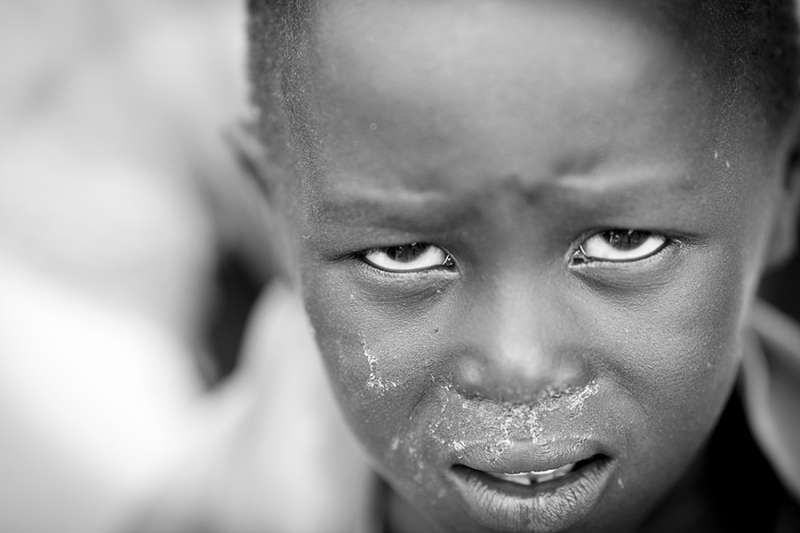On Friday an ecumenical delegation from South Sudan met privately with Pope Francis and again invited him to visit the war-torn nation, which they said is in desperate need of hope as the situation becomes more dire.
“We are here as an ecumenical body...we came as Christians to show that the body of Christ is bleeding,” Bishop Paride Tabani told CNA March 23.
The people, he said, “[need] hope. They need healing, they are crying for peace, which cannot be brought by arms, but by love, by a sense of compassion, a spirit of love and forgiveness which God has shown to us, especially now.”
“We would like that this Easter would also be a resurrection of people from their suffering.”
Tabani, Bishop Emeritus of Torit in South Sudan, was part of a 9-person delegation from the Council of Churches of South Sudan (SSCC) who met the pope in a private March 23 audience at the Vatican.
Members of the delegation included bishops and leaders of different Christian denominations in South Sudan, including Catholics, Anglicans and Presbyterians, among others. They updated Pope Francis on several joint initiatives of the council to provide humanitarian aid and prompt international leaders to intervene in finding a solution to the conflict.
In a March 23 press briefing after the meeting, Rev. James Oyet Latansio, secretary of the SSCC, described the meeting as “familiar,” and said they sat and talked with each other about a variety of issues.
South Sudan has been plagued by civil war for more than four years. The conflict has split the young nation on several fronts, dividing those loyal to its President Salva Kiir and those loyal to former vice president Reik Machar. The conflict has also bred various divisions of militia and opposition groups.
Discussion at the Vatican meeting focused largely on the humanitarian crisis and the situation of the more than 2 million South Sudanese refugees who have fled to surrounding countries, as well as the need to fill the post of deceased bishops, some whose dioceses have been vacant for years.
They also touched on when a possible papal trip might take place. Francis had intended to visit the war-torn nation last year alongside the Archbishop of Canterbury, Justin Welby. However, the trip was postponed due to security concerns.
According to the delegation, the pope expressed a strong desire to go, but gave no specific date.
In his comments to CNA, Bishop Tabani said the pope “is willing to go, but there have been negative reports and even in the Vatican…they told him the situation is not so good.”
According to Tabani, the situation on the ground is so desperate that people are nearly begging the pope to come as a sign of hope and consolation. He said that during their meeting, he reminded Francis how St. John Paul II in 1993 visited Khartoum in the midst of a violent genocide.
“That gave hope to the people, and then people became very courageous,” Tabani said, adding that with more than 2 million people are living as refugees, now is the time for another papal visit.
“People are dying from hunger, the economic situation is really bad...the people are eager to have consolation, and they are asking 'when will the Pope come?'” he said, explaining that in the meeting, Pope Francis told the delegation that “my heart is bleeding for the people in South Sudan,” and asked them to pray that the conditions would change, allowing him to come.
More than 2 million civilians have fled the country in the four years since violence broke out. Neighboring Uganda has so far taken in more than 1 million refugees from South Sudan, leaving resources strained.
In comments to CNA, Archbishop John Baptist Odama of Guru, Uganda, who was also part of the ecumenical delegation that met the Pope, said the situation is out of control. Many people had to flee with nothing but the clothes on their backs, and the majority of refugees, who face a worsening humanitarian crisis, are women, children and elderly.
“You have the youth who don't have enough food, they don't have enough medical support. What they get is the minimum. Some have died of malaria, some have died from other things like cholera, and then they don't have the facilities to prepare the children for the future, education,” he said.
Odama said the Ugandan government is willing to help and has pitched in with some NGOs, but lacks the resources to sustain the increasing influx of refugees while also supporting their own citizens who live in poverty.
In northern Uganda near the West Nile area, there are more than 300,000 people living in one camp, he said, explaining that this area “is the most difficult, because the government of Uganda has found itself in a certain level that it cannot afford, because its resources are also limited.”
“So to care for its own citizens and at the same time for refugees, it becomes very heavy. This is where the biggest challenge is.”
Both Bishop Tabani and Archbishop Odama voiced gratitude to Pope Francis for holding the Feb. 23 day of prayer and fasting for peace in South Sudan, the Democratic Republic of Congo and Syria.
They also asked that the pope appoint more bishops, because many bishops have died and none have been re-appointed. Tabani, who retired early to launch a project aimed at providing education to refugees and promoting peaceful coexistence, said his successor died five years ago and has not been replaced.
Tabini said that upon hearing their requests, Pope Francis did not immediately make any promises or guarantees. “He just listened,” the bishop said, adding that “it's good to be a good listener...this is what I like.”

